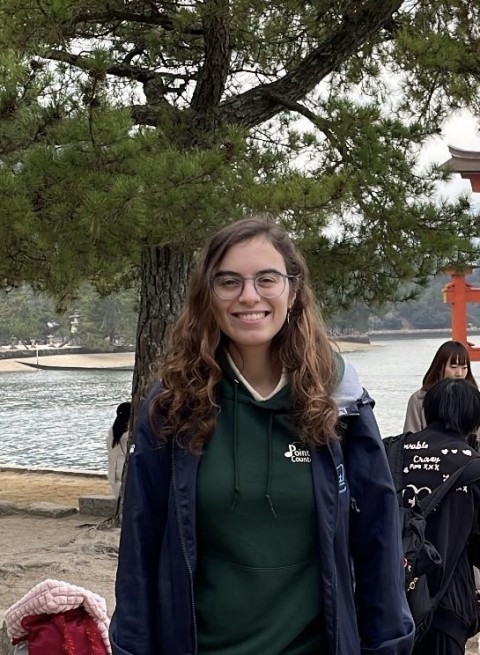Congratulations to Nina Kornfeld (CC’26) and Gulnazik Bakhramova (GS’26) on being named 2025 Projects for Peace summer fellows!
Nina Kornfeld (CC’26) and Gulnazik Bakhramova (GS’26) have each been awarded a Projects for Peace 2025 grant to design and implement an innovative, community-driven, and scalable project addressing some of today’s most pressing global challenges. Since 2007, Projects for Peace has empowered emerging student leaders through generous summer grants, allowing them to launch impactful initiatives in communities around the world. To date, over 2,000 projects have been carried out across more than 150 countries.
Gulnazik Bakhramova, GS’26, will facilitate the implementation of her award-winning initiative,
Kel Chai Ich, in her hometown of Kerben, Kyrgyzstan, this summer. A political science major with a concentration in international relations and comparative politics, Gulnazik is committed to advancing social justice, with a particular emphasis on women’s empowerment and equitable access to education.
Kel Chai Ich was developed both as an inspiration drawn from her own experience as a U.S. State Department exchange student in California and as a direct response to the systemic barriers—economic, social, and cultural—that often prevent young Kyrgyz women from pursuing higher education. Through this project, Gulnazik and her team will conduct workshops, design and deliver educational resources in both digital and classroom-based formats, coordinate structured local mentorship programs, lead guided university campus visits across Bishkek, and create supportive environments where Kyrgyz women can explore professional aspirations, build self-confidence, develop peer networks, and ultimately see themselves as part of collegiate academic spaces.
Nina Kornfeld, CC’26, an environmental biology major from New York City, has long been interested in how human activity shapes and disrupts ecosystems. As a Projects for Peace fellow this summer, she will explore the lasting legacy of U.S. nuclear testing in the Marshall Islands, where sixty-seven nuclear weapons were detonated between the 1940s and 1950s—one of which was over 1,000 times more powerful than the bombs dropped on Hiroshima and Nagasaki. While the long-term effects on the contaminated and now-uninhabited atolls—such as radiation poisoning, cancer, birth defects, and environmental degradation—are well documented, Nina’s project focuses on an under-explored area: the impact of lingering contamination in places where Marshallese people currently live and fish. While abroad, Nina plans to collect tissue samples from fish across a variety of marine habitats to help trace the radioactive contamination. However, at the heart of her project, is direct engagement with local Marshallese communities. Recognizing that the research findings will have the greatest impact on the Marshallese, Nina's project not only fills a critical gap in environmental health research but also brings attention to the often-overlooked legacy of U.S. nuclear testing in the Pacific. By emphasizing these historical injustices and addressing their long-term consequences, Nina's work highlights the deep connections between environmental science and social justice.
To follow the progress of these projects, visit the Projects for Peace’s ‘Annual Viewbook’, where summer projects are archived and program milestones are celebrated. And, for more information about the Projects for Peace summer opportunity, please reach out to Undergraduate Research and Fellowships.

